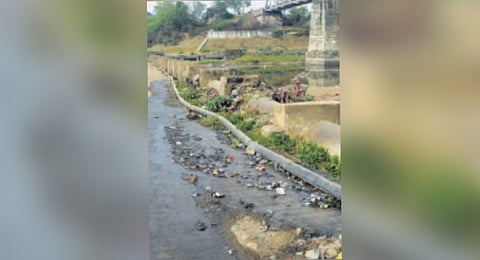

The Puranas say River Kshipra originated from the heart of Varaha, which was Lord Vishnu’s incarnation as a boar. The sacred river, which runs through parts of western Madhya Pradesh, including Ujjain, has witnessed significant degradation in its water quality over the years and has lost its perennial flow, running dry five to six months every year.
A performance audit conducted by the Comptroller and Auditor General of India (CAG) on the degradation of the river, covering 2016-17 to 2020-21, threw up a host of significant findings. It was perhaps the first performance audit conducted by the CAG on a river’s degradation in the entire central India. The audit based on problem-oriented approach started with the formulation of hypotheses about the probable causes and consequences. The hypotheses were tested during the field audit.
The two main hypotheses were that the river remained polluted even after multiple interventions of the state agencies and the natural flow the river reduced due to improper management and over extraction of ground water in the Kshipra sub-basin. Three departments were audited and information collected from 11 departments for the audit. The two prime hypotheses were divided into five sub-major and 22 minor hypotheses. The five sub-major hypotheses about the possible causes and consequences, included merging of untreated sewage in the river, inadequate treatment of industrial waste, pollution at riverbanks adversely affecting the water quality of the Kshipra and its two tributaries Kahn and Gambhir rivers, drastic reduction in the river water flow and decreasing ground water in the sub-basin affecting the flow of the Kshipra. The audit whose report was recently tabled before the MP Vidhan Sabha, concluded that sewage treatment plants (STPs) were not constructed by urban local bodies (ULBs) keeping in view future demands, while the sewerage network too didn’t cover the entire geographical area.
Even the sewerage network and STP related works were not completed as per timelines and the concerned ULBs lacked sound systems for disposal of faecal sludge. Some STPs were working on older technologies and the provision of reuse of the treated effluents was also not created by the ULBs.
The audit also revealed that the MP Pollution Control Board (MPPCB) belatedly granted consent to industries adjacent to the river basin. Earlier, the industries were operating without consent, but no action was taken against them. Some of the units had not even submitted online discharge monitoring reports/monthly testing reports to the Board.
Also, many industries either ran without effluent treatment plants (ETP) or were not equipped with alternative sources of power. Further, a proper mechanism for ensuring compliance of zero liquid discharge status wasn’t available and just 4% of the selected industries were actually found to be equipped with water meters. Audit also found deficient action against industries even though they violated provisions of the Water Act. Parameters of iron, cadmium, nickel and lead were beyond the permissible limit in the ground water of Dewas industrial area, but action against the defaulting industries wasn’t taken. The audit also revealed that guidelines regarding regulations in flood plain zones (FPZ) were not issued by the Nagar Nigams and encroachments were observed in the FPZ of Kahn and Kshipra rivers. Even the River Front Development work wasn’t executed properly. Planning for plantations was ineffective, plantation work was doubtful and reporting of plantations and selection of sites wasn’t correct.
Further, provision for providing water in lean season into the Kshipra river was made but not implemented, which meant that environmental flow in lean season couldn’t be achieved. The audit prominently pointed out that the government had completely deviated from the earlier aim of transforming the river into a perennial river by infusing Narmada river water into the Kshipra through the Narmada Kshipra Simhastha Link project.
However, with the new CM of Madhya Pradesh, Dr Mohan Yadav hailing from Ujjain, the government is now taking up the cause of Kshipra and its tributaries in a more proactive manner.
Yadav recently reviewed the water resources department’s works pertaining to purging of Kshipra river and its tributaries. He directed that polluted water of Kahn river emanating from Indore (country’s cleanest city) be strictly stopped from mixing in the Kshipra. He also directed that the water treatment process should start from Dharampuri in Dhar district (Kshipra rises from north of Dhar district) and the treated water be utilised for irrigating agricultural fields. Yadav further instructed the installation of treatment plants, which are in line with water rise in the command area of the Kshipra river. With the next Simhastha fair slated to be held in Ujjain in 2028, the CM issued directions to build better ghats, particularly small ghats to ensure that agricultural land isn’t affected.